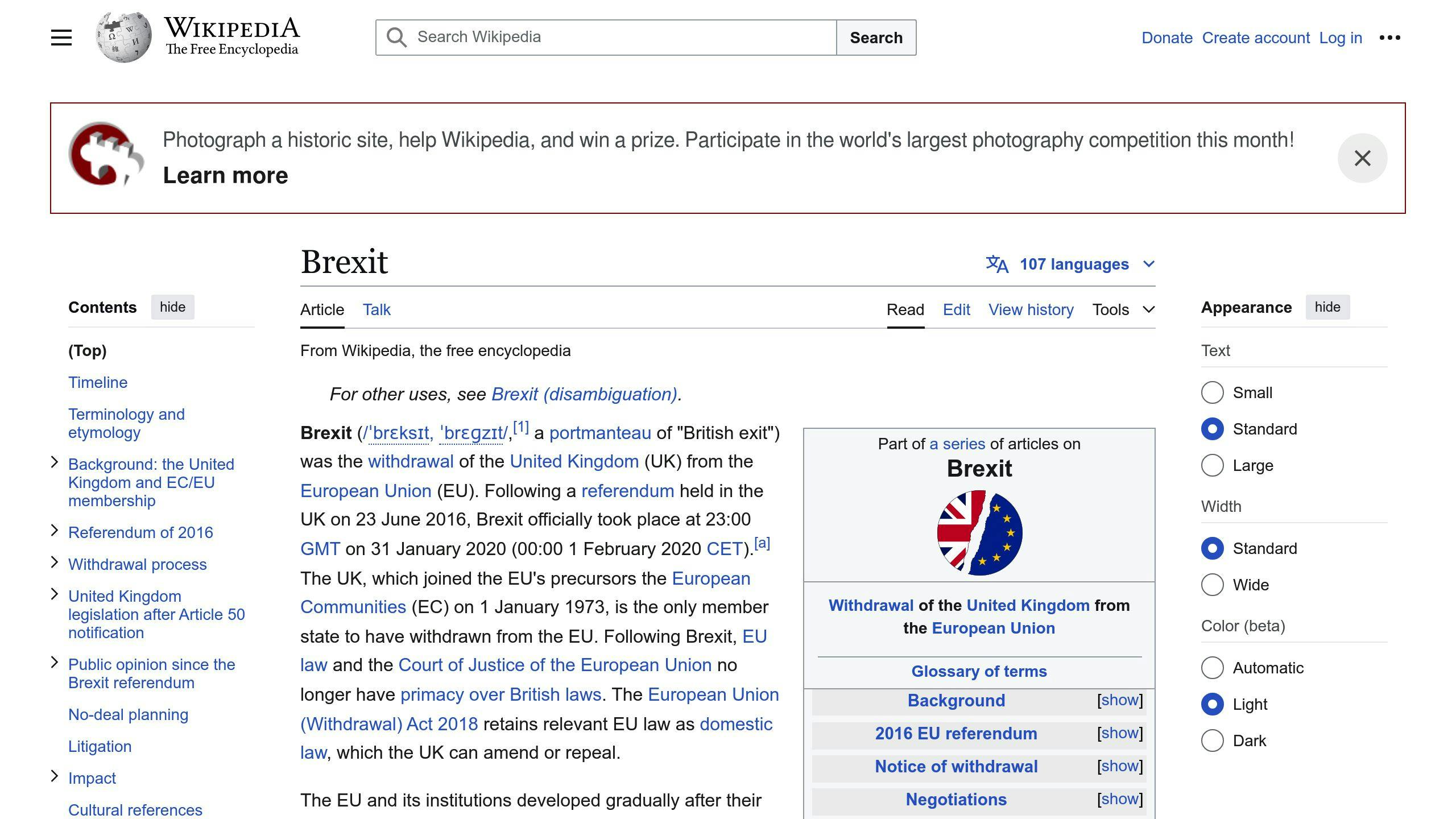UK AML Reporting Post-Brexit: Top Changes
Explore the significant changes in UK AML reporting post-Brexit, including new rules, risk assessments, and implications for businesses.
Save 90% on your legal bills

Brexit has shaken up the UK's Anti-Money Laundering (AML) rules. Here's what you need to know:
- The UK now has its own AML playbook, ditching EU directives
- New reporting requirements to UK authorities
- Updated risk assessment processes
- Enhanced customer due diligence, especially for EU clients
- UK-specific sanctions list
Key impacts for businesses:
- Update AML procedures and train staff
- Revise EU client onboarding processes
- Upgrade tech systems for compliance
Quick Comparison: UK vs EU AML Rules
| Aspect | UK | EU |
|---|---|---|
| Max jail time for money laundering | 14 years | 4 years |
| Sanctions authority | Independent | EU-wide |
| Risk assessment | Country-by-country for EEA | EEA treated as one |
| Crypto regulation | In progress | Included in 5AMLD |
The UK's post-Brexit AML landscape demands swift adaptation from businesses to avoid hefty fines and reputational damage.
Related video from YouTube
AML Rules Before Brexit

The UK's AML rules were tightly linked to EU regulations before Brexit. The country implemented the first five EU AML directives, which shaped its regulatory landscape.
Here's what the pre-Brexit AML setup looked like:
- The UK followed EU AML directives 1-5
- UK financial firms could easily operate across EU borders
- The UK's AML rules matched EU standards
EU AML Directives: The Backbone of UK Regulations
1. First AML Directive (1991)
Made money laundering illegal and introduced Customer Due Diligence (CDD) and Know Your Customer (KYC) processes.
2. Second AML Directive (2001)
Brought notaries, auditors, and tax advisors into the mix. Required reporting to the Financial Intelligence Unit (FIU).
3. Third AML Directive (2005)
Introduced a risk-based approach and set penalties for AML breaches.
4. Fourth AML Directive (2015)
Focused on transparency and created national registries for Ultimate Beneficial Owners (UBOs).
5. Fifth AML Directive (2018)
Required extra due diligence for high-risk country clients and included cryptocurrency exchanges.
The UK put 5AMLD into action just before Brexit through the Money Laundering and Terrorist Financing (Amendment) Regulations 2019.
| Directive | Year | Key Changes |
|---|---|---|
| 1AMLD | 1991 | Criminalized money laundering, introduced CDD and KYC |
| 2AMLD | 2001 | Expanded scope, mandated FIU reporting |
| 3AMLD | 2005 | Risk-based approach, penalties for breaches |
| 4AMLD | 2015 | Transparency focus, UBO registries |
| 5AMLD | 2018 | Enhanced due diligence, included crypto exchanges |
Fun fact: The UK skipped the EU's Sixth AML Directive (6AMLD). Why? They felt their own laws already covered most of it.
Main Changes in UK AML Reporting After Brexit
Brexit shook up the UK's Anti-Money Laundering (AML) scene. Here's what's new:
UK Rules Replace EU Ones
The UK now has its own AML playbook. The Sanctions and Anti-Money Laundering Act 2018 (SAMLA) is the star of the show.
What's different?
- UK can slap on sanctions by itself
- More power to freeze assets
- Easier to impose sanctions
New Reporting Rules
Reporting got a makeover:
- Suspect sanctions violations? Tell the Office of Financial Sanctions Implementation (OFSI)
- Focus on UK-based subsidiaries, not EU ones
- Non-restricted trade exemptions? Only for UK-linked deals
Risk Assessment 2.0
Risk assessment got an upgrade:
- Written AML/CFT risk assessments are a must
- Sanctions list risks matter for ALL clients
Customer Checks: New and Improved
Customer due diligence (CDD) is sharper:
- More digging into Ultimate Beneficial Owners (UBOs)
- High-risk country clients? Extra scrutiny
UK's Own Naughty List
The UK now has its own sanctions list. It's not using the EU's anymore.
| UK Sanctions List Info |
|---|
| Name |
| Birth date |
| Nationality |
| ID numbers |
| Last known address |
New Sheriffs in Town
- OFSI: Financial sanctions
- Financial Conduct Authority (FCA): AML compliance for financial firms
- HM Revenue & Customs (HMRC): Watches certain sectors like estate agents
"The UK sanctions list is a one-stop shop for details like names, birth dates, nationalities, ID numbers, and last known addresses."
This new setup aims to keep AML standards high while giving the UK more wiggle room.
sbb-itb-ea3f94f
What This Means for Businesses
Brexit has shaken up the UK's Anti-Money Laundering (AML) landscape. Here's what companies need to know:
Meeting New Rules
The Sanctions and Anti-Money Laundering Act 2018 (SAMLA) is now the main player. It brings:
- Stricter sanctions
- Quicker asset freezing
- New reporting to the Office of Financial Sanctions Implementation (OFSI)
Businesses must:
1. Update AML procedures
- Appoint a Money Laundering Reporting Officer
- Implement robust Customer Due Diligence checks
- Set up Suspicious Activity Report systems
2. Train staff
3. Upgrade tech systems
- Enhance transaction monitoring
- Improve customer risk assessments
- Streamline reporting to UK authorities
Working with EU Companies
Post-Brexit, EU dealings have changed:
- EU nationals are now "third country" entities
- Extra checks for EEA customers
- New rules for correspondent banking with EEA institutions
This means:
- More paperwork
- Longer processing times
- Possible need for legal advice
Tech and Data Changes
- New data protection rules
- AML software updates needed
Businesses should:
- Review data sharing agreements
- Update AML software
- Implement better fraud detection
"The new UK Trade Sanctions Unit (OFSI) aims to crack down on firms evading sanctions."
The UK wants to cut fraud and cybercrime by 10% by 2025. AML compliance is now a competitive edge.
Recent fines show the stakes:
| Company | Fine | Reason |
|---|---|---|
| ED&F Man Capital Markets Ltd | £17.2 million | AML failures |
| Equifax Ltd | £11.1 million | AML failures |
| Guaranty Trust Bank (UK) Ltd | £7.6 million | AML failures |
In 2023, the FCA collected about £53 million in AML-related fines.
The message? Adapt or face consequences. The new AML landscape is tough, but it's also a chance to stand out.
What's Next
The UK's AML landscape is changing after Brexit. Here's what's coming:
UK vs EU Rules
The UK's going its own way:
- No 6th AML Directive (UK says its laws are tough enough)
- Stricter checks on EU nationals
- Quicker asset freezing under SAMLA
FCA's New AML Plans
The FCA's 2024/25 plan has big changes:
1. Tougher enforcement
They're not messing around. In 2023, they hit companies with £53 million in AML fines.
2. Better tech
The FCA's upgrading its systems to catch financial crime faster.
3. Property transparency
A new public register will show overseas companies owning UK property.
4. ESG and financial crime
By late 2024, they'll tackle crime linked to environmental and social issues.
5. Crypto rules
The UK wants to keep crypto innovation going, but safely.
"The FCA will use its powers more to disrupt, chase, and punish those involved in financial crime." - FCA Business Plan 2024/25
What companies need to do:
| Area | Action |
|---|---|
| Tech | Upgrade AML and fraud detection |
| People | Train on new UK rules |
| Clients | Check EEA clients' risk again |
| FCA reports | Get ready for more questions |
Bottom line: UK and EU rules are splitting. Companies need to stay sharp and move fast to avoid big fines and bad press.
Wrap-up
Brexit changed UK Anti-Money Laundering (AML) rules. Here's what you should know:
1. UK's Own Path
The UK skipped the EU's 6th AML Directive. Why? It thinks its laws are tough enough already.
UK max jail time for money laundering: 14 years EU max jail time: 4 years
2. New Rules for EU Nationals
EU nationals in the UK are now "third-country" entities for AML checks. More work for UK firms.
3. Sanctions Power
The UK can now make its own sanctions under SAMLA. This might lead to stricter AML rules.
4. Risk Assessment Changes
Firms must check EEA countries' AML laws one by one. No more "EU is fine" rule.
5. More Work for MLROs
Money Laundering Reporting Officers have a bigger job now. They need to check:
- Client relationships
- AML laws in many countries
What This Means for You
| Area | Action Needed |
|---|---|
| EU Clients | Treat as third-country entities |
| Contracts | Review EU-based deals |
| Risk Checks | Assess EEA countries individually |
| Staff | Train on new UK rules |
| Tech | Update AML systems |
The UK and EU are going separate ways on AML. Keep your eyes open and be ready to adapt. The AML world is changing, and you need to keep up.
FAQs
Why did the UK opt out of the EU's sixth money laundering directive?
The UK skipped the EU's sixth money laundering directive (6AMLD) for a few key reasons:
1. Already compliant: The UK felt its laws already covered most of 6AMLD's requirements.
2. Tougher penalties: UK law hits money launderers harder:
| Jurisdiction | Max Sentence |
|---|---|
| UK | 14 years |
| EU (6AMLD) | 4 years |
3. Wider net: UK law covers more crimes linked to money laundering than 6AMLD.
4. No real benefit: The UK didn't see how 6AMLD would improve its anti-money laundering efforts.
"The UK government chose not to implement the most recent directive into national law because it considered that its domestic legislation 'is already largely compliant with the Directive's measures, and in relation to the offences and sentences set out in the Directive, the UK already goes much further'." - FinTech Global
This move fits with the UK's post-Brexit approach: sticking to its own rules, especially when they're already tough enough.







